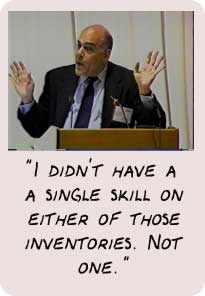|
|
Katalina Groh, Larry Prusak: Some of the world's leading thinkers |
| Storytelling: Organizational Perspective: Larry Prusak |
 |
How
do
you win the Nobel prize?
I was out at Berkeley last week.
There was a conference there that they hold every year. It’s very interesting.
Professor Nonaka and some other people get together. And there’s a woman
there who’s part of that team called Charlene Demuth, who has a book on
comparing Nobel Prize winners, and people who almost won the Nobel Prize.
So if you try to look at those groups, and ask, “Well, what’s the critical
factor between those who win it, and those who almost win it?”, well, you
have to eliminate intelligence, because they’re all super smart.
|
| But the second key issue
was that the density and richness of the networks of the people who win
it. And that makes a lot of sense to me.
I’ve never seen anyone succeed in anything in life endeavors, which take innovation and a different way of looking at things, that isn’t strongly community-based, group-based. I am not saying that we’re not individualistic in other ways. I am an individualist in politics and other ways. And I certainly believe in the sanctity of the individual. But in terms of knowledge, knowledge is in groups. It’s not in individuals. That’s why all those electronic yellow pages, and those skills inventories are a waste of money and time. None of them has ever worked. They work technically. But they don’t work in any real way, because it’s the wrong unit of analysis. I joined two big firms, Ernst & Young, and IBM. Each one recruited me and gave me a lot of money to join, and each one, when I joined, gave me a skills inventory, to fill out. I didn’t have one skill, not one, in either of those two inventories. Not one. I don’t know what skills I had, but they certainly weren’t listed there. And I said, “Gee, are you sure you want to hire me?” I had to fill them out and send them back and say, “I can’t program in C++, God help me.” |
| Books and videos on storytelling *** In Good Company : How Social Capital Makes Organizations Work by Don Cohen, Laurence Prusak (February 2001) Harvard Business School Press *** The Social Life of Information, by John Seely Brown, Paul Duguid (February 2000) Harvard Business School Press *** The Springboard : How Storytelling Ignites Action in Knowledge-Era Organizations by Stephen Denning (October 2000) Butterworth-Heinemann *** The Art of Possibility, a video with Ben and Ros Zander : Groh Publications (February 2001) |
| The views expressed on this website are those of Stephen Denning, and not necessarily those of any person or organization |
| Site optimized in 800x600: webmaster CR WEB CONSULTING |
|
|
|
|